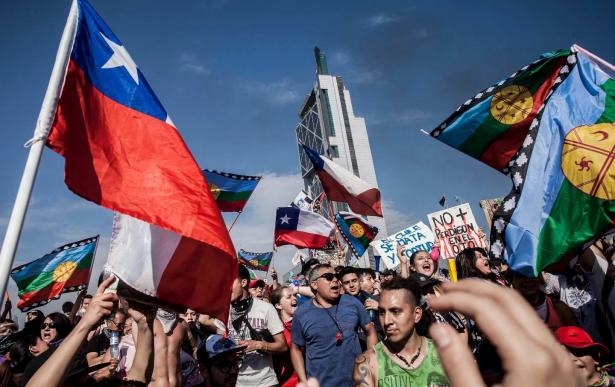labor Short of a General Strike, How Can Labor Stop Trump From Stealing the Election?
A rare bright spot in the endlessly discouraging 2020 news cycle was the triumph of ordinary people in Chile voting overwhelmingly on October 25 to rewrite their Constitution. A supermajority of Chilean voters, 78 percent, voted to scrap their country’s dictatorship-era, neoliberal Constitution and start over with a new vision of democracy. Chile’s trade unions played a big role in the get-out-the-vote effort. More importantly, millions of workers in Chile waged a series of massive strikes in 2019 across key sectors of the country’s economy. Those strikes played a decisive role in forcing the plebiscite. In the fall of 2019—when the Chilean president balked at demands by students and women’s groups for a bottom-up process to create a new Constitution—construction, dock, education, airport, mining, agricultural, and other workers all walked off the job in support of broad social demands for a better democracy.
There has been a lot of social media chatter about a general strike here in the United States if the results are ambiguous and Trump tries to steal the election. It would be amazing if national trade unions here were prepared to take the same actions in November 2020 that Chile’s national unions took in November 2019—but there’s absolutely no indication that people in positions of power in significant sectors of the US economy are ready to act as boldly as Chilean leaders did. Even if a presidential coup warrants a general strike, achieving one as early as next week is wishful thinking. As a campaign strategist, union organizer, and veteran of both the 2000 Florida recount and many supermajority workplace strikes, I believe it is urgent to remain deadly serious and sober about the actual possibilities when it comes to defending what’s left of our modicum of democracy.
The last time the United States was rocked by the kind of strikes that could shut down the nation was just after World War II. Many workers who took part in the 1945 and ’46 strikes worked in sectors whose jobs have long ago been automated or shipped to other countries. At the national level now, there’s been just one elected leader who has repeatedly mentioned the phrase “general strike”: Sara Nelson, the president of the Association of Flight Attendants. According to Nelson in a recent phone call, “Are unions ready? No. But are we theoretically capable? Yes.” Getting from capable to reality is a pressing project, for 2021, 2022, and throughout the next national administration—no matter who is in power.
What is possible now, and entirely likely, is that workers at a more local level across the country will take action—including strikes. Two Area Labor Councils, in Rochester, N.Y., and Seattle, have embraced a call for strikes if a coup is in the works. Aside from these councils, local unions can demand that their national unions break with the Democratic Party leadership in terms of strategy. Many regional and local unions are already engaged with social movement partners in a variety of efforts, including through the Working Families Party, in planning for massive direct action if Trump follows through on his threat to falsely claim he is the winner on election night, even if huge numbers of votes have not yet been counted.
But it’s crucial that we learn several key lessons from the disaster in 2000. As one of the first organizers to land in Palm Beach County the morning after the election in 2000 (and among the last to fly out from there over a month later, after the coup), I know that good legal strategies help, but they are no match for the forces behind Trump. In fact, some of the same forces that drove the illegitimate conclusion in the 2000 election are working the Trump rule-by-minority today, too. (Not to mention the fact that three members of George W. Bush’s legal team, John Roberts, Brett Kavanaugh, and Amy Coney Barrett, now sit on the Supreme Court.)


Spread the word